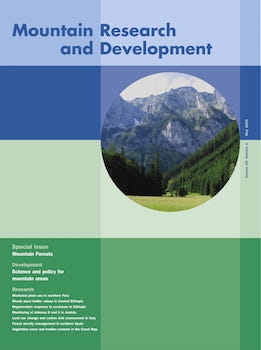Mountains: Sources of Water, Sources of Knowledge, edited by Ellen Wiegandt. Dordrecht, The Netherlands: Springer, 2008. ix + 384 pp. US$ 219.00, J 149.85. ISBN 978-1-4020-6747-1.
Mountains: Sources of Water, Sources of Knowledge is the latest publication in the Advances in Global Change Research series published by Springer. This book addresses the diverse challenges facing water resources within mountain environments, including temporal and spatial variability, competing demands, issues of potable water supply, and the challenges of hazard management associated with shortages or excessive quantities of this valuable resource. Mountainous regions are the source of many of the world's great rivers and areas of human development and settlement; as such, a long history of water use both as an energy and as a potable resource exists. The challenges identified within this volume are not always new, but through the case studies outlined, new approaches and solutions are presented, often developing on methods applied by indigenous peoples for centuries. This volume addresses contemporary global issues through the perspective of global change processes in mountain regions, bringing together interdisciplinary thinking from disparate disciplines to address key environment policy questions related to water resources.
The volume is divided into 5 themed sections, with papers addressing a variety of case studies within each theme. The first theme draws together a series of papers presenting an overview of water resources, hydrological dynamics, and societal response in mountainous regions. The second theme concentrates on the demands and competition for mountain waters and is examined through the use of case studies, such as Romerio's intriguing paper, titled “Hydroelectric resources and tensions between state and market forces.” The third theme addresses water conflicts and presents a timely contribution to this debate. Whilst considering contemporary economic issues, the long traditions of effective water management are also addressed, providing a valuable insight into problems relating to water use and transboundary resource management. The fourth theme is indigenous knowledge; the papers presented offer a valuable insight into historical approaches and technical solutions to contemporary questions of resource and risk management. The paper by Dubas, “A new ancient water mill: remembering former techniques,” is novel and interesting, as is the following paper by Gostner et al, “Water-related natural disasters: strategies to deal with debris flows: The case of Tschengls, Italy”; the presence of these two papers next to each other shows the breadth of subjects discussed within the chapters. The final chapter addresses the implications of efficient and equitable water use and access, drawing on examples from Central Asia where some water resources have been badly managed.
Overall, the book contains useful and valuable examples and case study reports relating to a variety of water resource issues. In drawing together the 18 papers from the Association Montagne meeting in 2002, a wide-ranging series of themes is brought together within one volume. Inevitably within a volume constructed from academic papers, the papers within the themed sections can appear somewhat disparate. This volume presents a collection of interesting papers that are well presented; most images are of good quality. Thus it will be of value as a library reference source but is unlikely to be purchased by the casual reader. The volume would have benefited from a summary or concluding chapter, drawing together many of the themes addressed within the papers, possibly based on the conclusions reached at the meeting. Nevertheless, it is a useful contribution to the literature base, containing interesting, pertinent case studies addressing contemporary water resource challenges within mountainous environments.





